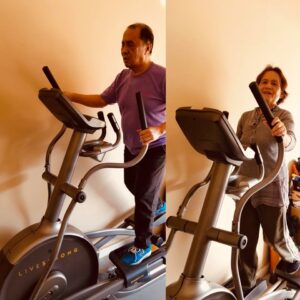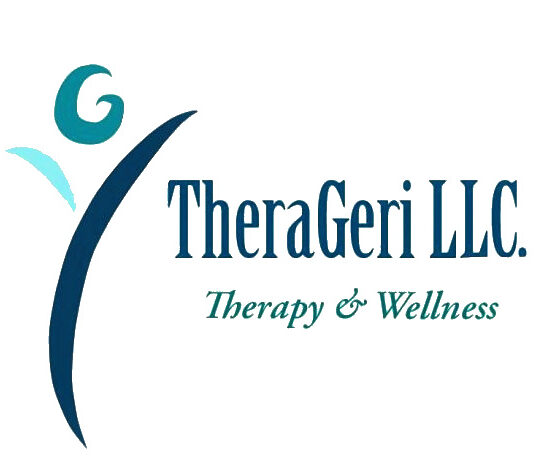Taking Care of My Older Adults
By: Charmine Kay Bartlett
There is always fear with the unknown. I, myself, am rattled with the situation brought about by the COVID-19 pandemic. I currently do not think of the outside world. I am gearing up to get ready with the battle ahead in my own household. I rebuke the thought that the situation may get worse but we have at risk family members to take care of during these unprecedented times, our older adults and young one. We are essential workers in our respective professions as therapists besides our own private practice. So, how do we manage to keep everything aligned? At the back of our minds, there is that thought of what we may bring home to them. Following CDC guidelines and prayers are our sword and shield. How about body armor??? Anyway, I might as well share our priorities. I am certain that each one of us would need ideas during these times.

We needed to go back to basics: water, food, medicine/ supplements, sleep, staying active through physical exercise and mental exercise too. It surely ain’t easy to be locked down when you are particularly not an introvert. Kidding aside…
Food intake is salient to one’s survival in the midst of viral pandemic. I do not tolerate panic buying because that would just bring chaos and cascade of problems to everyone. So, we only get the freshest produce and meat we could find in groceries (yes, …ies) and we prepare/ cook our meals. We sit and set up a meal plan a week to a night prior. We have two of our older adults with diabetes. Although, we also thought about supporting our small businesses in the community e.g. restaurants. Yet, we have to save every penny too. On one of these mornings of quarantine, we thought about the great depression when our great/grandma/pa had to do backyard vegetable gardening. I thought this was a brilliant idea! Thus, we made it as a project in place. At the same time, it is a good resource of physical activity that they might enjoy.
Water intake is equally important. This is easily overlooked by seniors because with the aging process, they have decreased thirst sensation. “Age-related changes make older adults more vulnerable to shifts in water balance that can result in overhydration or, more frequently, dehydration.” I always make sure to remind my senior patients the need to drink adequate amounts of water, being really particular because of concerns on the effects of some medicine too. “Drinking five or more 8-oz. glasses of water (but not other liquids) per day has been associated with lower rates of fatal coronary heart disease in middle aged and older adults than drinking two or fewer glasses. And in one study, drinking 16 oz. of room temperature water before a meal resulted in significantly lower rates of postprandial orthostatic hypotension in older adults who had autonomic failure.” It could be really expensive, I know. Thus, we invested in water filters.
Organize medicine/ supplements intake. From years of experience with care of older adults in the community, I have witnessed how easy it is for them to forget which and when to take medicine. I am not to talk about the hazards of polypharmacy here but it is important to make sure of your seniors’ medicine being available. I am not a medical doctor but I believe in supplements, which I favor Vit. B, D, and E, and Calcium. I would like to mention this in particular- Vit. D, with which synthesis is triggered by UV rays (sunlight), helps absorb calcium that is needed for bone growth and helps regulate protein synthesis to build/repair muscle fibers. Limited sunlight exposure could cause Vit. D deficiency, which is linked to older adults’ increased risk for falls. “older adults with vitamin D deficiency also have an increased risk of muscle weakness and bone diseases such as osteomalacia (softening of the bones) or osteoporosis (reduced bone density) as well as an increased risk of rheumatoid arthritis and type 1 diabetes…..Low levels of vitamin D are an increased risk for both falls and fractures…”
Recently, the wonders of probiotics have also been in the spotlight. I, myself, experience first hand the good it offers. Primarily, it supposedly increases your immune response and “help your body maintain a healthy community of microorganisms or help your body’s community of microorganisms return to a healthy condition after being disturbed.”
It is hard for seniors to take medicine because of a culture they are used to when growing up. They do not like to rely on medicine. They have higher tolerance to pain, mind you. But awareness education of their medicine’s importance to keep their health afloat in these times is a must.
Being quarantined is a no joke, I get that. It was easy to take for granted the things we are so used to doing e.g. going to work, to eat, to exercise and to mingle with people. It keeps our sanity intact until it is challenged. Grateful for the technology innovations of computer games, mobile phones, social media etc. “Quarantine is often an unpleasant experience for those who undergo it. Separation from loved ones, the loss of freedom, uncertainty over disease status, and boredom can, on occasion, create dramatic effects. Suicide has been reported, substantial anger generated, and lawsuits brought following the imposition of quarantine in previous outbreaks” I find it ironically laughable when previously, a person staying at home watching Netflix all day entails laziness until recently, it is coined as being responsible in the peak of the COVID-19 pandemic. But then, this could be a good time to prepping ideas, who knows may click in the near future! Keep your seniors’ brain cells active by reading, playing chess or board games e.g. Monopoly, finding words, puzzles, crosswords, and well, deciphering common core math with your kids! Or simply, have conversations.
A phone call to mom/dad once in a while may also bridge the gap miles away if distance is a barrier. We are social beings, isolation could be a psychosocial determinant of your seniors’ chronic condition exacerbation.
Get enough sleep. There is always a downside on every excessiveness. Maybe, some of us, because of being on a quarantine, may tend to undersleep or oversleep. According to the Sleep Foundation, “sleep is a vital indicator of overall health and well-being. Older adults (65+): Sleep range is 7-8 hours.” A good night’s sleep is a time when our body replenishes, recovers and builds from our body’s work prior so we could have the energy needed for the following day’s work or play. The National Heart, Lung, and Blood Institute stated, “Sleep deficiency is linked to many chronic health problems, including heart disease, kidney disease, high blood pressure, diabetes, stroke, obesity, and depression.” Similarly, sleep duration, “both short and long sleep duration (≤5 hours or ≥9 hours) to be at increased risk of higher BMI, diabetes, and hypertension…. short and long sleep duration (≤5–6 hours and >8–9 hours) were associated with a greater risk of developing or dying of stroke.”
Finally, to stay active with physical exercise. “80% of US adults and adolescents are insufficiently active. As a result, many Americans currently have or are likely to experience chronic diseases, including heart disease, diabetes, obesity and depression.” I could somehow foresee the post effects of quarantine to our older adults if we overlook the seriousness of lack of mobility: a domino effect of debility. As per Physical activity guidelines for Americans, “Older adults (ages 65 and older) should do at least 150 minutes of aerobic activity a week and include muscle-strengthening activities 2 days a week. You should also add components, such as balance training as well. Adults with chronic health conditions and disabilities, who are able, should do at least 150 minutes of moderate-intensity activity a week. If you have limitations due to preexisting conditions, consult with a health care provider and be as physically active as your abilities allow.” Simply walking, as we know of, may enhance our older adults’ fitness. Thus, make it a routine to walk with your seniors for at least 30 minutes per day, which you could do by 10 minutes increments 3x per day, be it inside home or around the home outside.
If you are like me, everyday for the past weeks, I try to pep talk myself that everything will be okay. Yes, this too shall pass. Resilience is an element to work through this but it does not mean to just wait and see. There is a reason why human beings are different from other animals – we can think! Remember to take into consideration with empathy any decision to take because this is bigger than we all can comprehend. Compensate through all adversities, including this situation, so we all can live the way we wanted, again! Protect our loved ones. Don’t let them be just another statistic in this era.
Reference:
https://thesurvivalmom.com/survival-wisdom-great-depression/
https://www.cdc.gov/coronavirus/2019-ncov/prevent-getting-sick/prevention.html?CDC_AA_refVal=https%3A%2F%2Fwww.cdc.gov%2Fcoronavirus%2F2019-ncov%2Fprepare%2Fprevention.html
Mentes, J., Oral Hydration in Older Adults: Greater awareness is needed in preventing, recognizing, and treating dehydration, AJN, American Journal of Nursing: June 2006 – Volume 106 – Issue 6 – p 40-49
https://ods.od.nih.gov/factsheets/VitaminD-HealthProfessional/
https://www.todaysgeriatricmedicine.com/news/ex_012511_02.shtml
https://www.nccih.nih.gov/health/probiotics-what-you-need-to-know
https://www.thelancet.com/journals/lancet/article/PIIS0140-6736(20)30460-8/fulltext
https://www.sleepfoundation.org/articles/how-much-sleep-do-we-really-need
https://www.sleephealthjournal.org/article/S2352-7218%2815%2900015-7/fulltext
https://health.gov/sites/default/files/2019-09/Physical_Activity_Guidelines_2nd_edition.pdf



